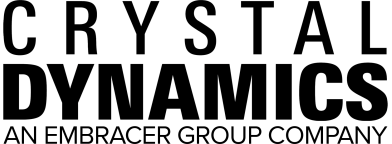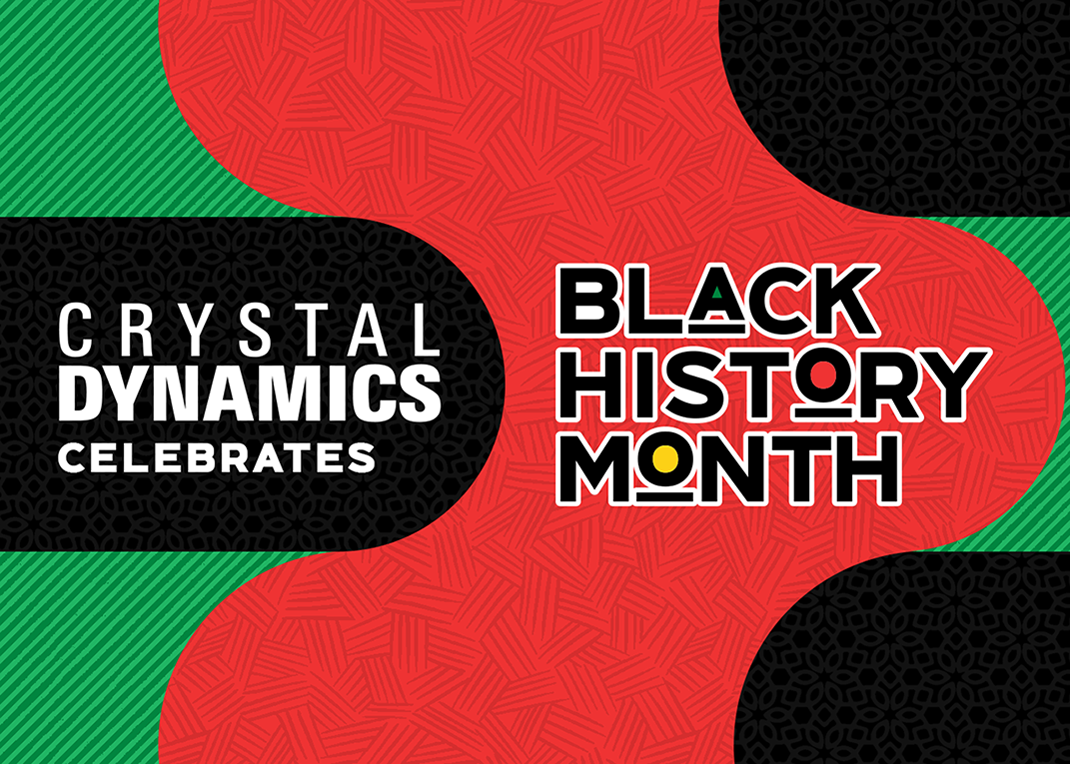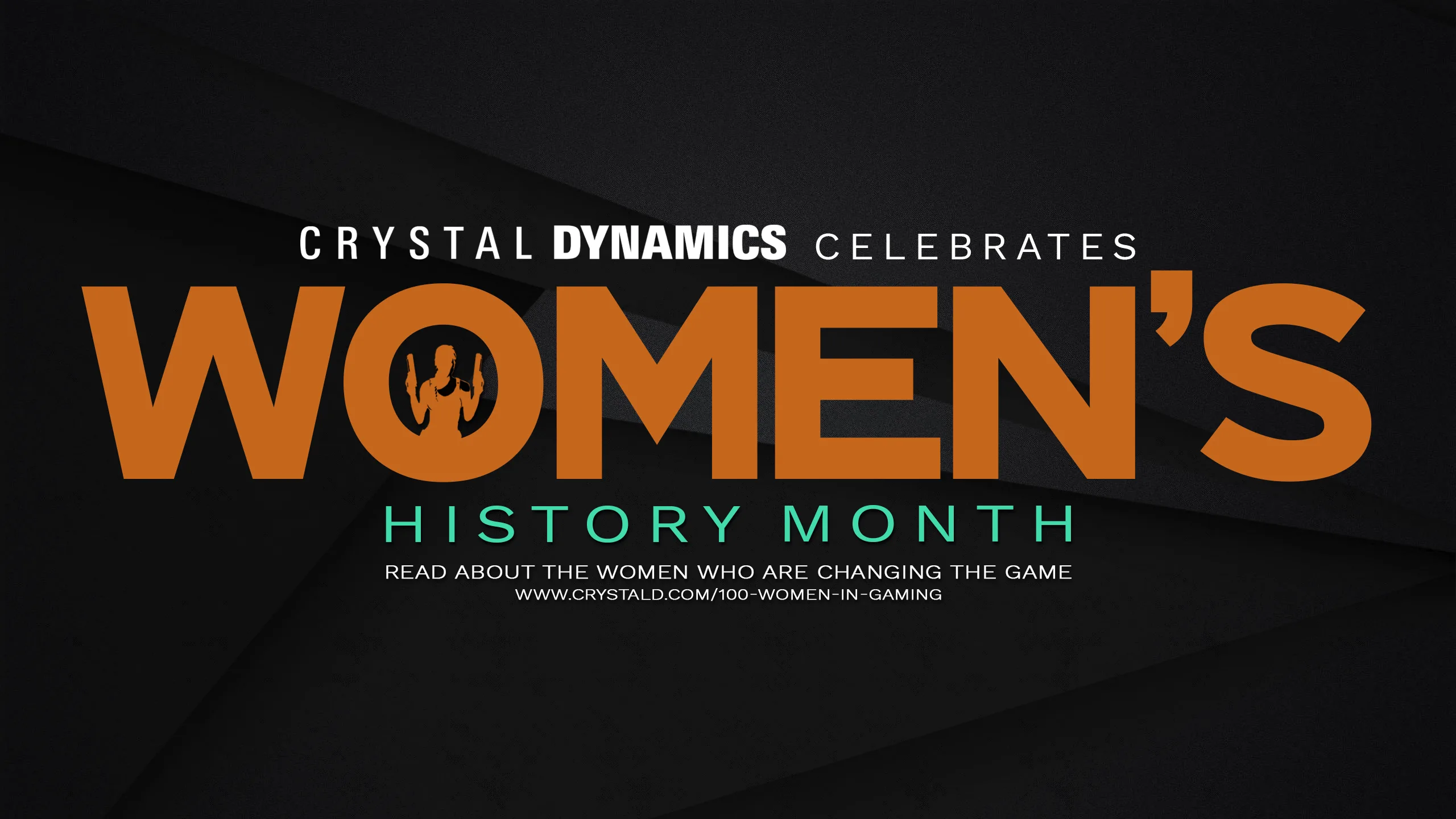
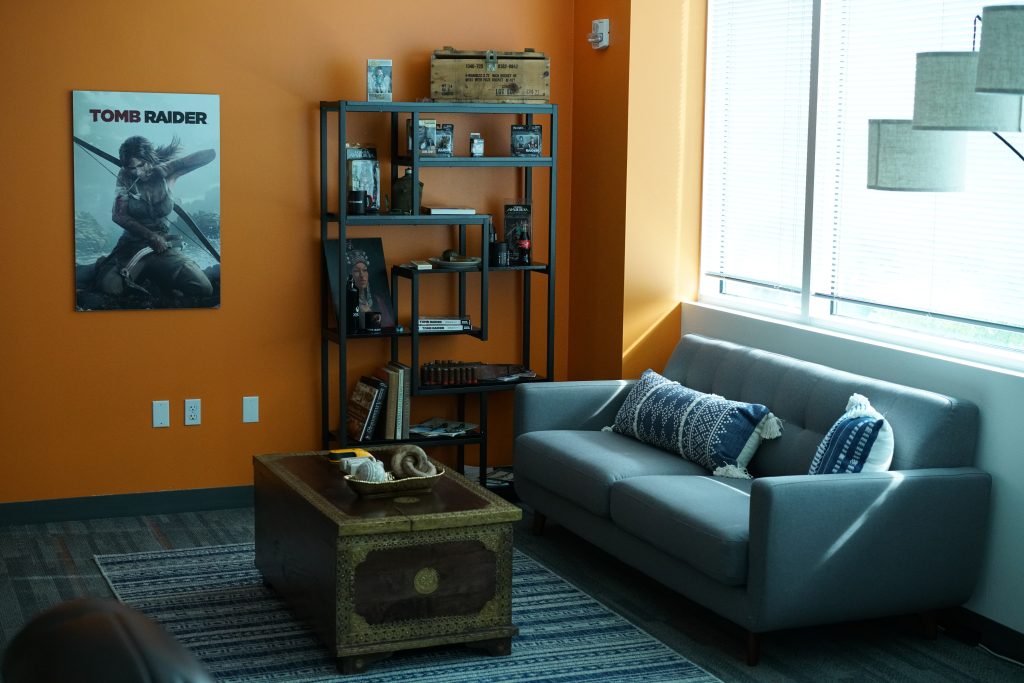
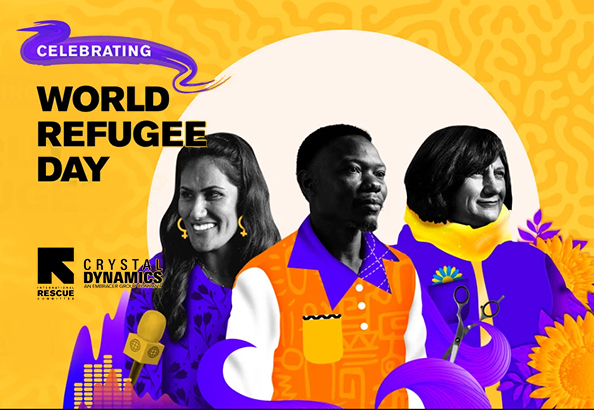
Celebrating Changemakers This World Refugee Day
To mark World Refugee Day this year we sat down to chat with Senka Filipovic – Associate Director of Gaming at the International Rescue Committee – and Lual Mayen – a game developer from South Sudan – to highlight how refugees are changemakers shaping the future of communities big and small in extraordinary ways.
Please enjoy our chat below, and feel free to celebrate #WorldRefugeeDay with the IRC on social by raising awareness, uplifting voices, or donating to their great causes.
A WORLD REFUGEE DAY CONVERSATION WITH SENKA FILIPOVIC & LUAL MAYEN
Vanessa Brasfield: Hello everyone! My name is Vanessa Brasfield. I’m a Community Coordinator here at Crystal Dynamics, and today we are talking with some lovely people as part of our efforts to raise awareness for World Refugee Day. First, some quick introductions. Senka Filipovic is the Associate Director of Gaming at the International Rescue Committee (IRC), and we are also joined by Lual Mayen, a game developer from South Sudan. Welcome to both of you, glad that we could have you here today!
Senka Filipovic: Thank you so much.
Vanessa: You are very welcome! Senka, can you talk a bit about your journey working at the International Rescue Committee?
Senka: Sure. And a big thanks to Crystal Dynamics for doing this with us, and of course, Lual, for joining us and together marking World Refugee Day. As you know, the International Rescue Committee is a global humanitarian organization that helps people affected by conflict and disaster to survive, recover, and rebuild their lives. We have been around for nearly 90 years, we work in over 40 crisis-affected countries around the world, and we also help refugees resettle into their new communities throughout Europe and the Americas.
My journey with the IRC starts back in the mid-90s and is a pretty personal experience. I was born and raised in Sarajevo, in Bosnia and Herzegovina where unfortunately a conflict occurred. That ultimately forced me and my family to have to flee our country in search of safety. We were refugees in Croatia when we first came across the IRC and it was from there that the IRC helped me and my family resettle in Sacramento, California, where we were ultimately able to start rebuilding our lives. This obviously had a very incredible impact. It was a life-changing experience for me. And even at a very young age, the IRC left a big mark. As a result, all through my education and early career, I continued to pay attention to the IRC and the work the organization was doing with a deep desire to someday return to them as an employee and pay it forward for people unfortunately going through similar experiences today.
I’ve been at the IRC for eight years now. I’m part of the International Philanthropy and Partnerships team where I’ve been working with different companies to support our mission and work. In the last two years I’ve taken on developing our engagement with the gaming industry and communities. As somebody who loves video games, it has been such an amazing, meaningful experience, especially given the incredible generosity of the sector and its communities. So that’s basically my journey, and a little bit about who we are.
Vanessa: Thank you for sharing! Lual, can you set the stage in talking a little bit about your experiences growing up at a refugee camp, and the importance of recognizing World Refugee Day?
Lual Mayen: First, I want to thank the International Rescue Committee for giving me this opportunity. And to Crystal Dynamics for giving us the chance to talk exactly about what World Refugee Day is, and what we experience as refugees.
Like Senka mentioned before, for us as refugees we come from all over the world, and we are all relatable. There are so many issues that affect people worldwide, be it climate change, or war, or anything that doesn’t allow for peace where they are born. I was born in 1993 and my family and I are from South Sudan. There has been war for over 53 years in some way. And when my family left South Sudan, we fled because of war. It wasn’t a good choice for them. My mom and dad woke up that morning trying to find a place of refuge. It was life and death, to choose to flee and not know where you would live tomorrow.
My family didn’t know where they were going. The focus was to find a place to survive, find a place to call home. I was born along the way when my family was fleeing South Sudan. There was no water, and there was no food. It was just about surviving from the viewpoint of my family. Turns out that the government of Uganda was able to help us and welcome us and give us the opportunity to settle in Uganda.
When I became a refugee as a child, that was my home. I didn’t know any different. I didn’t know the country that my family call home. I didn’t grow up there. I grew up in Uganda as a refugee, and so that was all my memories.
Vanessa: Thank you for sharing your difficult story. Senka, how is the IRC recognizing World Refugee Day? And can you speak about some of the themes of refugees being more than they carry?
Senka: Yes. So, every year on World Refugee Day, which falls on June 20, the latest data is released by the UN Refugee Agency on the number of people who are displaced around the world. This year’s data shows that we have a record high of 110 million people that have been forced to flee their homes due to conflict, disaster, and other types of crises. And it’s important to know that displacement today is at the greatest level since World War II. So, I think that alone shows the critical need for us to mark this day and to recognize what is happening globally for a variety of reasons. But also, as part of World Refugee Day, it’s not just about the data and the numbers — it’s also about awareness-raising and helping people understand who refugees are, what are their stories, and the importance of welcoming refugees into their new communities. So, for the IRC, every year we focus on having a campaign that uplifts the stories of people behind these numbers in their own words, and celebrating all that refugees bring into their new communities and the resilience that they bring.
This year our theme is “refugees are changemakers.” And we are focusing on highlighting both the remarkable as well as everyday ways that refugees are influencing our society, whether it’s art, food, ideas, policy, games, pretty much every aspect of our culture and our lives in our, you know, respective countries. That’s really what we’re trying to highlight and bring attention to this incredible influence that refugees have on our communities. And people can read these incredible stories that we will be sharing out, and we already are on our social channels, on Rescue.org and then also they can visit, rescue.org/worldrefugeeday, where we provide a lot of different information and stories as part of this campaign.
Vanessa: And it’s come up a couple of times already talking about video games. So, Lual, when did you first become interested in video games and making games and what games were important to you early on?
Lual: First, I was going to add to what Senka just mentioned about World Refugee Day and as a refugee what it means to me. It’s like any country celebrating independence. It’s a platform for us as refugees to be recognized. It’s even more than being recognized for what you’re doing. I always advise people, in your society or community if you know refugees, don’t just hear about their stories, tell them about how important they are in your life. What have you learned from them? What excites you about them, as they are humans as well? Refugees are not just here to survive; we are here to thrive and be changemakers and contribute to society. Some of us can maybe be developers and maybe work with Crystal Dynamics or different companies as entrepreneurs. This is why I am always excited to have a platform to show what I am. And this is why World Refugee Day is the most important day.
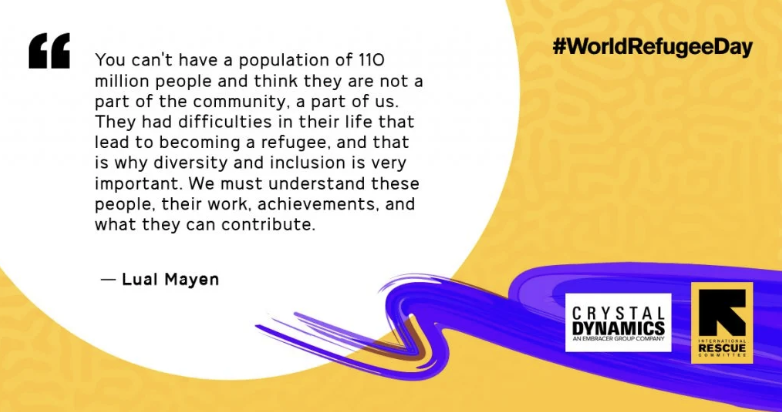
One of my favorite quotes is by Martin Luther King Jr. who says, “we may have all come on different ships, but we’re in the same boat now.” No matter the walks of life we come from, the most important thing we can do as humans or companies, or society is to be able to recognize other people.
When I first got into video games, there was a refugee registration, in 2007/2008, and we were standing in the line, and in the line, we were using a laptop to take data. And that was my first time seeing a laptop. So, I look at my mother and I’m like, “what is that?” And she told me it was a laptop. At that time in my mind, I decided I wanted to use a computer one day.
A couple of years later, I came to my mom, and I said I wanted to buy a laptop. She asked about where we would get the money, and where we would find power to charge the computer, where are you going to learn. But because she is a mother she was not discouraging, she worked for three years for $300 to buy me my first computer in a refugee camp.
When I got my first computer, I was like: now what do I do? I live in a refugee camp. There’s no power. There’s no Internet. So, I started to go to a base camp which is a refugee center. I would walk for three hours every day to go charge my computer. And then one day I think I went to an Internet cafe and my friend installed Grand Theft Auto for me.
I came back and I saw the icon and asked “what is this? Oh, it’s a video game!” I never knew that people made video games, I thought they just fell from heaven, you know. And I started to play and realized that… wow, games are so powerful. I’m from a country where 75 percent of the population is under the age of 30. They were born in war or raised in war. So even in a refugee camp, everything they do and the way they solve things is conflict, because that is in their mind. When I was playing a video game I thought: what if I make a game for peace and conflict resolution? Because I realized that games are really very powerful tools that we can tell stories, we can connect, and we can change the world. And that’s the reason why I began trying to make a game.
Vanessa: Thank you so much for sharing that; it’s greatly appreciated. Senka can you share why you are so passionate about games and how you think the gamers can help?
Senka: Absolutely. I mean, so passionate about games. It’s something me and a few colleagues at the IRC have been advocates of for some time now. And luckily our organization has stood behind us and given us the green light to explore gaming. But it’s really because exactly what both of you are talking about: it’s that power of games that can really make such an enormous difference.
There’s so much creativity. There’s such a reach, and it just seemed like it would be a great fit for the work the IRC is doing globally.
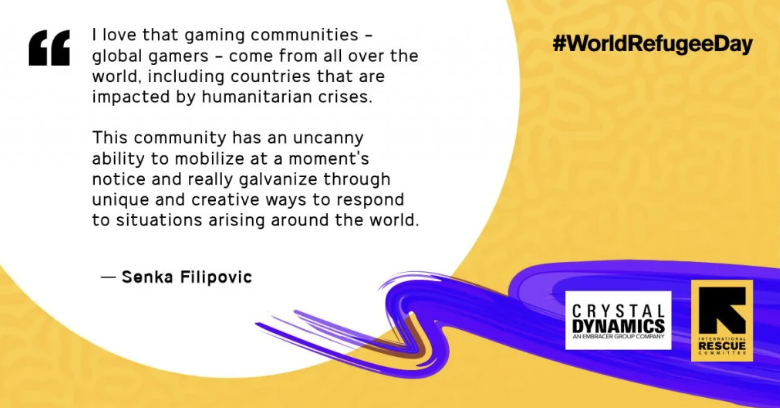
I love that there is that connection between the industry and the communities and sort of working together to maximize their impact. And I feel like gaming has also brought this entirely new way of digital philanthropy. So, whether it’s through charity, livestreams, in-game activation, large-scale gaming competitions, tournaments, and so on… I just love that there are so many ways to make a difference, and really, for people to utilize their talents, to make an impact on the world.
I mean, I can’t think of a better way of doing something good in the world. So, we as an organization are very invested in this space. We want to be that organization that is trusted, and that the community turns to in moments of crisis. But also, we want to be there at all times, right? We want to build that connection to the gaming community year-round. You know, come up with new and different ways of engaging together and be active partners in this sort of a joint effort to raise awareness, inspire people and ultimately have a positive impact on our communities. There’s just so much to celebrate in this space.
Vanessa: Excellent. Now we’re going to talk about some game dev. So, Lual, this is your time to shine and talk to us about your company Junub Games and Salaam. What was your goal in developing this game? And what do you hope players will take away from playing it?
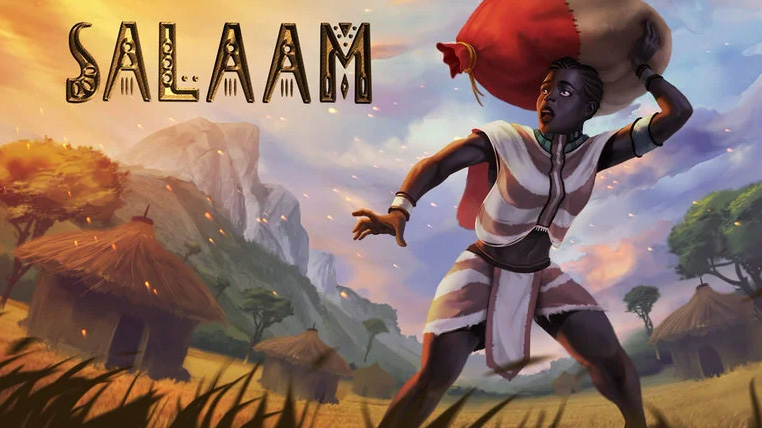
Lual: Yeah, thank you so much. I think when I started a new game, my focus was to try to create a game for impact, for education, and to be able to use my experience to be able to create a game. If we are not the ones telling our stories, then it becomes so difficult. That was my biggest inspiration. We can become what we can’t see sometimes.
I always say that the game industry is an industry of people who love and create what they want to play. And so, I look at the industry and I say “wow, okay, why don’t you create something like this that tells a powerful story.” And that’s why I started creating Salaam.
Salaam is a game about the flight of a refugee from a war-torn country who is trying to find a place of refuge. And for you as a player, you can understand what that journey is. For many people being a refugee is a status, but they don’t understand what that journey is. And if as a society we don’t understand what that journey is, then there is no way we can support them when they are settled.
So, my focus in the game is for people to understand what a journey of a refugee is. For example, today many people make policies, and they have no idea what that journey is like. And at the end of the day, you don’t have that experience and empathy. And I always say that empathy is very important in games in a way that even somebody like a 15-year-old can play Salaam and say “Wow! You know, refugees go through this and something like this.” In the next 20 years they’re going to be in a place of power, and because they have experience, they can make better policy. And that’s why education is very important. That’s why we must talk to people about what a refugee goes through. And that’s my focus right now and why I’m working on Salaam. There has been so much support from the industry, and right now we have a showcase in France where people can go to a museum and play the game for free. I also want to not just create a social game; I want to create a business out of the game as well. That is important as a refugee, to show that we create business. And that is why I am always happy to share about it.
I also have my foundation, and my focus is on talent and opportunities. You might see someone in a refugee camp who is super talented, but they don’t have the resources. We focus on game development, graphic design, and teaching kids in the refugee camp how to make games. So, I think we do all these small things that help create a society of refugees that can not only survive, but also work.
Right now, we actually have a festival coming up in DC where we will showcase Salaam and people can play it for free, it’s called First Gen Festival in Washington D.C. But it is coming out very soon. We are trying to finish with some funding and so on. I am also focusing on my foundation, and we have a big announcement happening with Epic Games soon, so those are the two big things.
Vanessa: Senka, how can people support World Refugee Day this year and support the IRC year-round?
Senka: Yeah, thanks so much for that question. And I do want to just acknowledge that we are talking about very heavy topics. And very large-scale global challenges that I think sometimes can feel a little bit overwhelming for people when they think, well, what can I possibly do for something that is on such a massive scale? But I do, you know, really want to stress just how much difference every individual can make. Gamers in general have shown that they have such a great ability to create impact with actions in their control, utilizing their own passion and talents. But in general, there are many ways that people can support us, whether they’re in the gaming community or not, for World Refugee Day and beyond. First, I would say, please don’t get discouraged. You know each act that you make basically strengthens the IRC’s ability to help people. And as part of that, it is important to stay informed. So please follow us on social channels, visit our website at rescue.org and just try to stay on top of some of the things that are happening in the world. Of course, people can donate to us, directly through our website, or we would love to engage with gaming communities in charitable activations, live streams, and so on.
I think the other thing that’s important is to help us spread the word. Use your social networks to highlight the IRC’s work, uplift the voices of the people that we are serving and that we’re trying to highlight during World Refugee Day and beyond, and help us advocate for policies that have a clear impact on the communities that we are serving and ultimately inspire and encourage others.
I mean, I think the only way for us to be able to respond to these global challenges is if we have more and more people get involved and get inspired and just do what they can. I think it’s up to every individual to decide what works for them. But I just want to reassure everyone that every bit helps ultimately. So, in short, you know: give, mobilize, activate your networks, and inspire others. I think that’s the way to go.
Vanessa: Excellent. You heard it here. Anything helps, a dollar helps, word of mouth helps, following socials helps. Make sure that you drop off your gifts over at Rescue.org, and there’s plenty of ways to get involved. We hope to see you supporting World Refugee Day and the IRC year-round. Thank you both so much!
